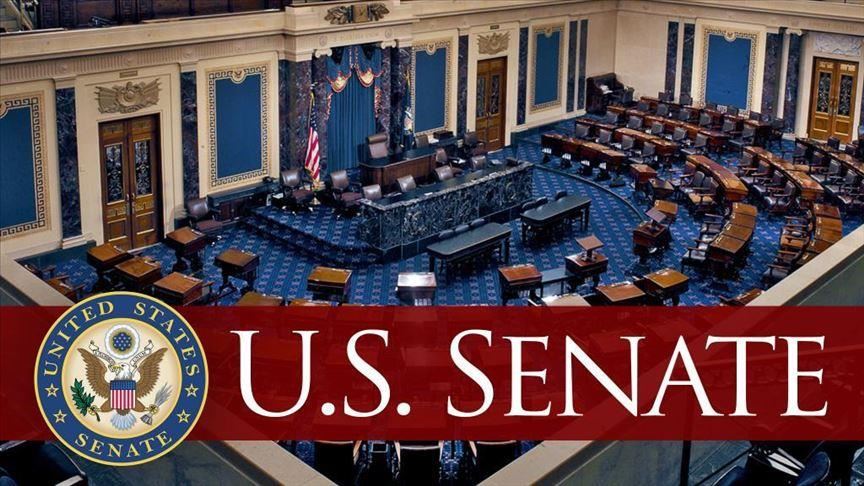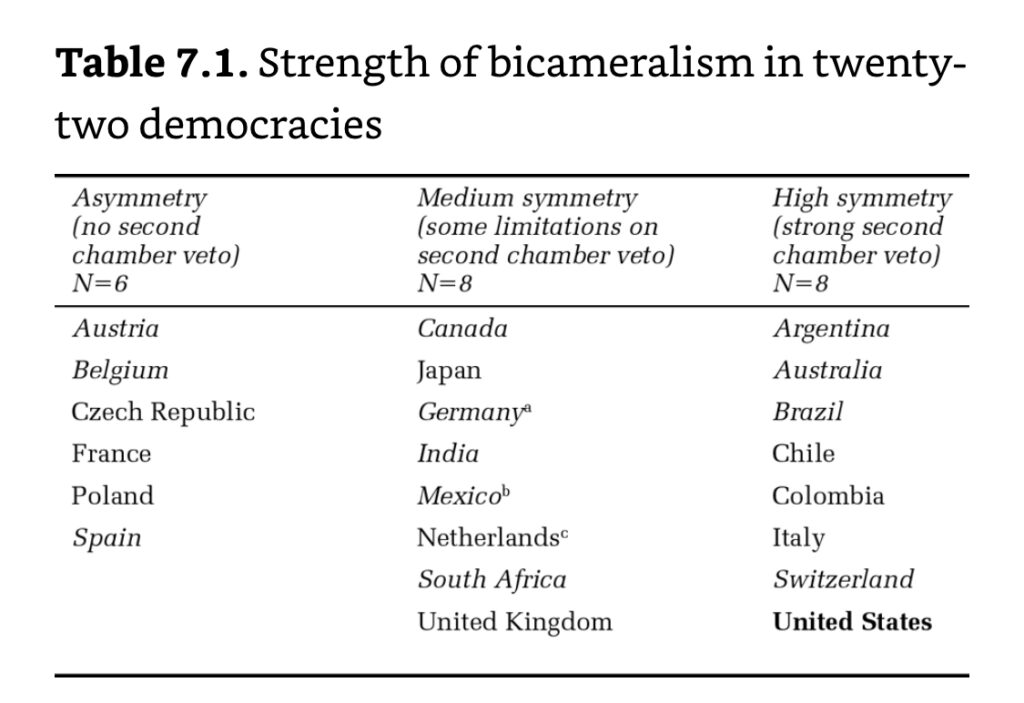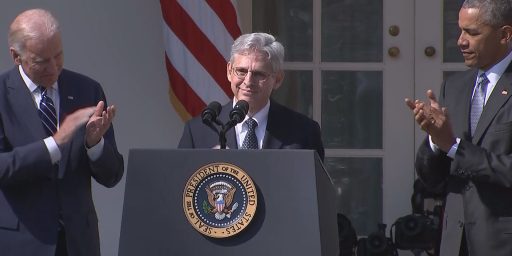On Senate Reform
A proposal by Jamell Bouie

Jamelle Bouie at the NYT has been thinking a bit about the US Senate (see, e.g., here) and his latest column (There Are 100 People in America With Way Too Much Power) contains a reform suggestion (that yes, is exceedingly unlikely to occur):
What I would write is simple. I would repeal the 17th Amendment, returning the election of senators to each state legislature, and restoring the federal nature of the chamber. But to compensate for the end of popular election of senators, I would also strip the Senate of its power to introduce or veto legislation.
In my vision, the Senate would be a council of revision that continues to represent the states as states. I think this is necessary because the United States will likely be a federal democracy for as long as it exists, and the system should probably accommodate the interests of state governments (insofar as they exist) in one way or another.
He is proposing what comparative political scientists would call assymetrical bicameralism. That is, two chambers but with differing legislative powers. As he notes in the column, this is a fairly common institutional arrangement. Here’s a table from A Different Democracy classifying the 22 democracies with bicameralism in the study.*

The italicized cases are federal.
“Symmetry” means that the chambers have equal legislative powers. Assymmetry means that they do not have the same legislative powers and that the first (or lower, depending on one’s preferred lingo) has legislative supremacy. Medium symmetry is a range. For example, in the UK the only significant legislative power the House of Lords has is delay, while in Mexico the limitation is the the second chamber has cannot block the budget. In Germany, the second chamber (which is appointed) is limited as to the types of legislation it can influence.
It is striking that several of the cases of symmetrical bicameralism are western hemispheric cases that used the US Constitution as a model.
It is also worth noting that the US Senate is the only second chamber with anything like the filibuster power, which actually enhances the significance of that chamber to the point that it is arguable the most powerful and significant second chamber in the world. (And if memory serves, its advice and consent powers are amongst the strongest, if not the strongest, in the world).
Back to Bouie’s proposal.
My Senate could not block House legislation, but it could offer amendments if it chose to take action. Those amendments would then be voted on by a conference committee of House and Senate members, for final approval. If the Senate decides to hold a bill for revision, it has a set amount of time — let’s say 60 days — with which to act. If it does not act in that time, the bill is deemed passed and goes to the president for signing.
The Senate would retain its oversight powers as well as its power to approve treaties and offer “advice and consent” to the president for judicial and executive branch nominees. But “advice and consent” would mean an actual hearing and an actual vote.
The idea is to move the locus of policymaking back to the House of Representatives (which I would like to enlarge to at least 600 members), and to make it the most important chamber in the operation of government. In this scheme, it might be worth extending House terms to three years to reduce the pressures of campaigning and allow members more time to develop expertise, should they seek it.
As a theoretical matter, I have no objection to the federal chamber having the ability to insert proposed changes into the law as it may pertain to state-level interests as long as they would still have to get it passed as described. But as it stands, states representing very small numbers of citizens have near-veto power over national legislation. This makes governing very difficult.
I would agree, as I have noted often, with expanding the size of the House (probably a bit larger than 600, but that would work) but I would extend House terms to four years.**
In general, Bouie has the basics correct, in my view:
My basic principle here is that the popular chamber of Congress should also be the most influential one. You see some of this in the Constitution as written — Article I, Section I establishes the Congress and Section II establishes the House — but I’d like to make it the defining part of our constitutional system. I also think that we’d have a more agile and effective government if we removed the veto point that is the Senate.
Really, as a matter of democratic theory, the chamber that is designed to represent the population broadly ought to be the focus of governance. It shouldn’t be on the president, because that just leads to authoritarian thinking (or, at least, Green Lanterism). Nor should the unrepresentative chamber be able to be as influential as ours is.
But if one prefers to ignore contemporary pointy-heads and their fancy theorizing, I would point back to ye olden pointy head James Madison (sometimes called “The Father of the Constitution”) and ask folks to consider the centrality of the House of Representatives in his Virginia Plan (or even how he wrote about legislative power in Federalist 51).
* I would note that I have not recently reviewed these materials, published in 2014 and analytically delimited by the year 2010. It is possible there have been changes, although it seems unlikely.
**Two years is, as I have noted many time, too short–it creates a permanent campaign cycle. Further, the legislative and executive elections should be aligned so that voters can either reward or punish a party for how it governs or vote in divided government on purpose.





Bouie had me up to the repeal an amendment thing. There’s a thing on the right about repealing the 17th amendment. But if they see red state legislatures getting control of senators, they’re not going to go along with cutting the power of those senators.
Looking at your list, nothing jumps our wrt which system results in better governance. (I define better governance as adherence to the rule of law, the ability and will to address problems and opportunities, and the wisdom of competence of the actions it takes in pursuit of addressing those issues.) Yes, the “High Symmetry” side has a bunch of clinkers in there but, as you mentioned, many modeled themselves after the US, presumably because they didn’t have a legacy of democracy themselves. Essentially, they were imposed rather than evolved democracies, and that factor may have more to do with their outcomes than the structure of their representation. Switzerland is also in that list, and my impression is they would score in the higher range of effective governance.
So you’re telling me there’s a chance. YEAH!
Sincere question for OTB crowdsourcing – are there any actions that can be taken as a voter, an activist, or a modest donor that would improve the odds for some/any governmental reform in the US? Even our one functional party isn’t electing candidates on platforms of reforms more complicated than eliminating the filibuster.
I’d really like to dream of a better system for my children, but it seems my dreams would be better spent imagining the boys gaining superpowers. I mean, at least spiders are real and they could be made radioactive, right?
@MarkedMan: I made no claim one way or the other about good governance as it pertains symmetry v. asymmetry. I was simply explaining the concept.
@Scott F.: Step One is basic understanding. I am not sure we are even a tenth of the way down to that first step, TBH.
@Scott F.:
Sorry, it doesn’t work. I was doing PET scans 4-6 times a year for about 5 years. Nurse in a bunny suit with lead apron, lead thermos with lead liner, etc, etc. Very disappointing… Never turned green or smashed my way out of the lab.
Curse you Stan Lee for crushing my dreams.
@Steven L. Taylor: sorry, I should have been clear. Looking for ties between the form of government and good governance is my thing and so when I saw the list I was hopeful there was some obvious correlation. I wasn’t implying that you were making such a claim.
More power to gerrymandered state legislatures seems like a terrible idea all around.
@Scott F.:
IMO, the first thing that ‘s needed is to get rid of the filibuster in the Senate. Very little legislation can be passed when a supermajority is required, and no reforms at all.
@Steven L. Taylor: After public discussion increases and before adoption of Senate reform at the Federal level comes adopting and road-testing it in several states and gaining momentum. US Senators won’t acquiesce and accept fundamental reforms until the heaviest possible pressure from voters in most states. The only way to gain such momentum for more representative, responsive government in DC is to practice it in several states. Nebraska has had a unicameral legislature for 85 years. Whether or not state reform must go that far, it hasn’t hurt Nebraskans. It was a hard lift there in the 1930s, and it won’t be easy to do any part of it again in other states, but that’s how impervious the US Senate is to popular will. So step 2 would be start looking at the quality of your own state democracy.
@Grewgills: I don’t disagree as a general matter, but it is a trade I would make.
@MarkedMan: @MarkedMan: I think that saying that country A is poorly run, thus system 1 is bad is not the correct way to look at it. Some countries are going to be run more poorly than others no matter what type of government they have.
The question for us in the US is whether there are ideas out there that raise the ceiling and/or the floor on the quality of our government. And I believe that an increase in democratic rule raises our floor. Taking away the powers mentioned in this post would do that.
I would also note that I would prefer to also make the senate at least some what more representative of the population, but it is one of the few things that the constitution forbids without a state agreeing to its lose of representation, thus an amendment to add another senator for every million people in a state or take one away for some low population could be blocked by a single state.
@Steven L. Taylor: I was afraid that was the best answer. It’s exhausting shouting into the wind.